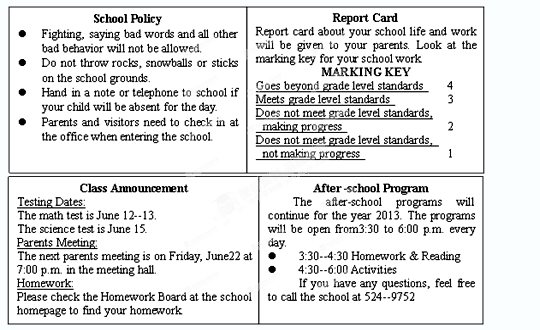题目内容
| broadcast1/'br?:dkɑ:st||?br?d?kæst/n[C] a programme on the radio or on television: a radio news broadcast | live broadcast ( =" a" programme that you see or hear at the same time as the events are happening) broadcast2 v past tense and past participle, broadcast 1 [ I,T] to send out radio or television programmes: The interview was broadcast live across Europe. 2 [T] to tell something to a lot of people: There was no need to broadcast the fact that he lost his job. broadcaster /?br??dkɑ?st? || ?br??dkæst?r/ n [C] | curious/?kj??ri?s || 'kjur-/ adj 1 wanting to know about something: When I mentioned her name everyone was curious. | [ +about] I’m incurious about this book she's supposed to be writing. |curious to see/hear/know etc: Mandy was curious to hear what Peter had to say himself.—opposite INCURIOUS 2 strange or unusual: a curious noise coming from the cellar | curious that It's very curious that she left without saying goodbye. curl1 /k?:l|| k?rl/ n 1[C] a small mass of hair |
| flask / flɑ:sk || flæsk/n [C] I BrE a special type of bottle that you use to keep liquids either hot or cold, for example when travelling 2 a flat bottle usually used to carry alcohol 3 a glass bottle with a narrow top, used in a LABORATORY flat1/ flæt / adj flatter, flattest 1? SURFACE? smooth and level, without raised or hollow areas, and not sloping or curving: a flat-bottomed boat |a perfectly flat sandy beach | flat as a | pollute / p?'lu:t/ v [T] 1 to make air, water, soil etc dangerously dirty and not suitable for people to use: beaches polluted by raw sewage | industrial emissions that pollute the air 2 pollute sb’s mind to give someone immoral thoughts and spoil their character: fears that Lawrence's novels would pollute young minds--polluted adj: polluted rivers--polluter n [C] pollution / p??lu:?n /n [U] 1 the process of making |
【小题1】The pronunciation of the word "broadcast" is ____ or/?br?d?kæst /.
| A./'br?:dkɑ:st/ | B./'br?ud'sɑ:st/ | C./bræd'k?st/ | D./'bru:dkɑ:st/ |
| A.pollute | B.pollution | C.curious | D.curiously |




| A. | B. | C. | D. |
| A.to tell something to a lot of people | B.wanting to know about something |
| C.a programme on the radio or on TV | D.to make air. water, soil, etc dirty |
| A.a magazine | B.a dictionary |
| C.a newspaper | D.an advertisement |
【小题1】A
【小题2】C
【小题3】D
【小题4】D
【小题5】B
解析

 The Tulip Festival in Ottawa | |
| Origin | Began in 1954. |
| Time | Host in the first 2 or 3 weeks of May each year. |
| Development | Has become the world’s largest tulip event. |
| Influence | JAttract hundreds of thousands of tourists. JTulip is a symbol of friendship and friendly diplomatic(外交的) relations. |
A.You can join the Tulip Festival on International Labour Day in 2014.
B.The Tulip Festival started in 1955.
C.Tulip isn’t a symbol of friendship.
【小题2】Which city has the world’s largest tulip event?
A. Canada B. Ottawa C. Newsland
Every school has notice boards. Let's see what is on the notice board of an American school.
【小题1】 46. From , parents can get information on the parents meeting.
| A.School Policy | B.Report Card |
| C.After-school Program | D.Class Announcement |
| A.certain school rules | B.after-school activities |
| C.plans for classes and tests | D.children's school life and work. |
Report Card.
| A.1 | B.2 | C.3 | D.4 |
| A.from 3:30 to 4:30 | B.from 3:30 to 6:00 |
| C.from 4:30 to 6:00 | D.from 6:00 to 7:00 |
| A.hand in a note | B.call at 524-9752 |
| C.check in at the office | D.telephone the school |
FUN TIME
Are you tired of the puzzles you usually do? Sudoku is a new choice. Sudoku consists of the Japanese characters Su (meaning “number”) and Doku (meaning “single”), but it was not invented in Japan. It was created by Howard Garnes in 1979. The puzzle was first introduced into Japan by Nikoli Puzzle Company in 1984. In 1986, Kaji Maki, the president of Nikoli made the rules strict and clear. Soon in the same year Sudoku became popular in Japan. In November 2004, The Times, a British newspaper, first printed it in the newspaper. It became an international hit in 2005. Now Sudoku becomes very popular all over the world.
The rule of the puzzle is to fill in the grids (格子) so that every row, every line and every 3×3 box has the numbers 1 to 9. Here is a Sudoku. Please relax and enjoy. It’s fun!
| 9 | 2 | 4 | 7 | 6 | 3 | 1 | 5 | 8 |
| 5 | 3 | 6 | 8 | 9 | 1 | 4 | 2 | 7 |
| X | 7 | 8 | 2 | 5 | 4 | 9 | 6 | 3 |
| 7 | 1 | 9 | 3 | 4 | 2 | 5 | 8 | 6 |
| 4 | 8 | 3 | 6 | 1 | 5 | 2 | 7 | 9 |
| 2 | 6 | 5 | 9 | 8 | 7 | 3 | 4 | 1 |
| 3 | 9 | 7 | 4 | 2 | Y | 6 | 1 | Z |
| 6 | 5 | 2 | 1 | 7 | 9 | 8 | 3 | 4 |
| 8 | 4 | 1 | 5 | 3 | 6 | 7 | 9 | 2 |
根据以上杂志专栏内容,回答下列问题。
【小题1】Who created Sudoku?
| A.Howard Garnes. | B.Sudoku. | C.Kaji Maki. | D.Nikoli. |
| A.He was the boss of Nissan Company. |
| B.He helped to make Sudoku popular in Japan. |
| C.He was the president of The Times. |
| D.He is an American. |
| A.Sudoku wasn’t invented in Japan. |
| B.It was The Times that first printed Sudoku in the newspaper. |
| C.Each grid has more than one number. |
| D.It became popular around the world in 2005. |
| A.5. | B.4. | C.3. | D.1. |
| A.8. | B.5. | C.2. | D.4. |
If you plan to take your pet on a trip,prepare ahead of time. At least two weeks before you leave,take your pet to a vet. See if he or she is tit for travel and ask if he or she should have any medicine before leaving. The vet may suggest certain pills for sickness or for calming the pet.
Some states or foreign countries have health laws that say animals must have certain injections(注射)before they can be allowed to enter. Your vet may have this information. You can also get help on the United States and Canadian laws from a book published by the Department of Agriculture which some libraries have. For information on foreign countries, check with their consulates (领事馆).You can also ask the airlines on which you are travelling.
Find out if the places where you plan to stay allow pets because many do not.
If you are going by plane or train,ask if pets are allowed. If they are,ask where they will be kept and who will care for them. The big bus lines in this country do not allow pets.
Choose your pet’s box carefully. Plastic boxes are better than cardboard or wooden ones because they can' be chewed(嚼碎).
If going by plane or train during warm weather,try to go in the cooler early morning or evening hours. Also try to avoid (避免)very cold winter weather because pets often suffer from cold. Even in your own car, be careful. Do not leave the animal inside with the windows closed because the car may become too hot or too cold.
【小题1】The main idea of this passage is to_________
| A.warn people to leave their pets at home |
| B.give general information about pet travel |
| C.tell people how to choose their pet boxes |
| D.tell people about foreign pet laws |
| A.doesn' need to make any special plans |
| B.should stay at friends' homes |
| C.should make plans before leaving home |
| D.should travel by bus instead of plane |
| A.it costs too much to take pets on trips |
| B.some pets may not be well enough to travel |
| C.all train lines treat pets exactly the same |
| D.pets are welcome everywhere |
| A.A vet. | B.A pet owner . |
| C.A bus driver. | D.A pet shop owner. |
Everybody can suffer from stress.No matter what your age is, you can feel stressed out by things that are happening in your life.Teenagers, however, have many more opportunities to get stressed than people in any other age group.Being a teenager is hard.You are not a child any more, but you are not an adult, even though you have to deal with some very grown-up problems and decisions.Families can be one of the biggest causes of stress, such as problems with parents arguing at home.or problems with brothers and sisters.Teenagers also have a lot of stress from school, either from their teachers or from their friends.Some teenagers also feel stressed about choosing their education after high school.Getting a place at university can be very difficult and some cannot afford to go to university.The stress about getting a job when finishing school is hard for some teenagers.There are so many young people finishing school and not enough jobs for them.Sadly, there is nothing we can do to remove these causes of stress from the 1ives of teenagers, but you can learn the best way to deal with it.Talking to people is one of the best ways to deal with stress.It may sound simple, but it is true.A problem shared is a problem halved.
【小题1】Why is being a teenager often difficult?
| A.Because even though you are not an adult, you must deal with adult problems. |
| B.Because even though you are an adult, you must deal with children’s problems. |
| C.Because even though you are a teenager, you must do a lot of homework. |
| D.Because adults often make them feel stressed. |
| A.by asking them to go to university |
| B.by helping them with their homework |
| C.as teenagers quarrel with their parents, and their brothers or sisters |
| D.as families never support their children enough |
| A.Because there is a lot of competition for jobs. |
| B.Because there are no jobs. |
| C.Because a job is more difficult than school work. |
| D.Because there is a lot of competition for places at university. |
| A.by not trying to find a job |
| B.by forgetting about our problems |
| C.by getting a place at university |
| D.by sharing our problems with our friends |
现在网络越来越发达,中学生上网的利弊已成为人们讨论的焦点。请参考下面的信息并结合自己的观点写一篇60—80词的短文谈谈你的看法。
| Pros | Cons |
| 课后放松[来源:学科网ZXXK] | 长时间上网有害健康 |
| 辅助学习 | 沉迷网络游戏,不思学业 |
| 传递信息快捷,开拓视野 | 不良网站,误导学子 |
| 网络交流,交友…… | 虚拟网络,真假难辨…… |